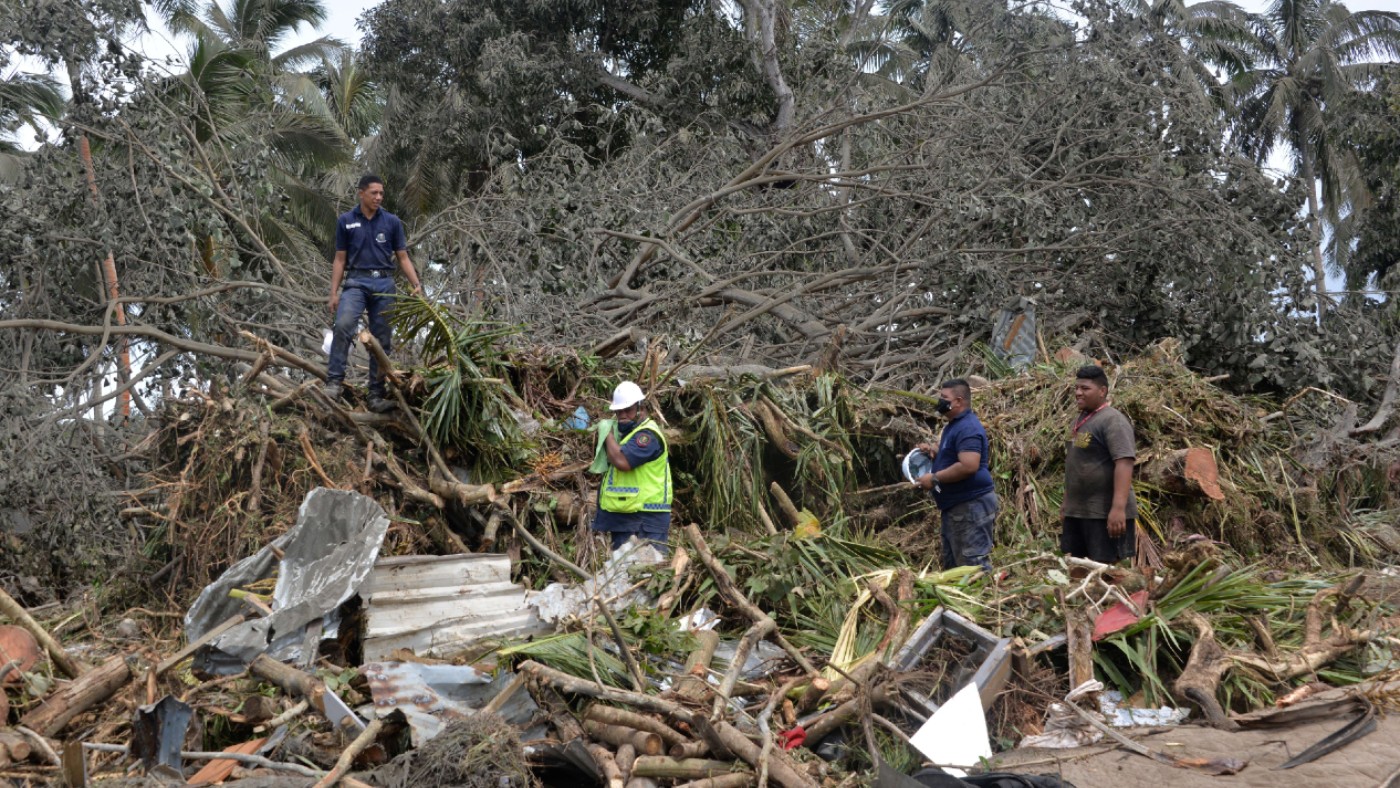Tonga’s tsunami: the aid effort turns political
Efforts to help Tonga’s 105,000 residents have been beset by problems

A free daily email with the biggest news stories of the day – and the best features from TheWeek.com
You are now subscribed
Your newsletter sign-up was successful
The eruption of Tonga’s Hunga Tonga-Hunga Ha’apai underwater volcano on 15 January could be heard 5,800 miles away in Alaska, said Loop Tonga (Nuku’alofa).
It is thought to be the world’s biggest such event in 30 years: the blast spewed an ash plume 12 miles above the South Pacific archipelago, creating an ash umbrella 150 miles in diameter that blotted out the Sun, covering cars, roads and buildings in a film of residue.
The eruption also triggered a tsunami that had “a devastating impact” on some coastal areas and low-lying islands, said Matangi Tonga (Nuku’alofa). On Mango Island, “all houses were destroyed”. The confirmed death toll in Tonga is so far only three, including a British national, Angela Glover. One man, Lisala Folau, survived by swimming for 27 hours after being swept away by waves. But water supplies have been contaminated and infrastructure damaged; concerns over the fate of the outlying islands remain.
The Week
Escape your echo chamber. Get the facts behind the news, plus analysis from multiple perspectives.

Sign up for The Week's Free Newsletters
From our morning news briefing to a weekly Good News Newsletter, get the best of The Week delivered directly to your inbox.
From our morning news briefing to a weekly Good News Newsletter, get the best of The Week delivered directly to your inbox.
Efforts to help Tonga’s 105,000 residents have been beset by problems, said Nick Perry in The Sydney Morning Herald. The single underwater cable on which the country relies for communications was ruptured; the ash cloud stopped planes carrying aid landing for days.
Fortunately, aid has now begun to arrive on ships and planes from Australia and New Zealand; but there are fears aid workers could bring Covid to the virus-free nation: last week, an Australian plane was turned back when a case was detected on board.
Tongans’ fears are “an echo of past trauma”, said Damien Cave in The New York Times. In the century after Captain Cook reached the region in the 1770s, Tonga faced imported epidemics of measles, dysentery and influenza. One measles outbreak in the early 19th century killed up to a quarter of its population. Inevitably, the virus is still “viewed through the lens” of past experience.
The aid effort has become something of a “geostrategic” tussle, said Michael Field in Nikkei Asia (Tokyo). Australia, New Zealand, the US and China are all offering aid. China’s influence in Tonga has been growing: Beijing awarded a US $108m loan (worth 25% of Tonga’s GDP) to rebuild after major riots in 2006 – a debt it has refused to write off.
A free daily email with the biggest news stories of the day – and the best features from TheWeek.com
China – which already has an “unexpectedly large” embassy in Tonga – senses a chance to bring a key South Pacific outpost under its influence; it is pushing for state-backed firm Huawei to bag a role repairing communications infrastructure. Beijing clearly has other motives here than its own “sense of humanitarianism”.
-
 What are the best investments for beginners?
What are the best investments for beginners?The Explainer Stocks and ETFs and bonds, oh my
-
 What to know before filing your own taxes for the first time
What to know before filing your own taxes for the first timethe explainer Tackle this financial milestone with confidence
-
 The biggest box office flops of the 21st century
The biggest box office flops of the 21st centuryin depth Unnecessary remakes and turgid, expensive CGI-fests highlight this list of these most notorious box-office losers
-
 The fall of the generals: China’s military purge
The fall of the generals: China’s military purgeIn the Spotlight Xi Jinping’s extraordinary removal of senior general proves that no-one is safe from anti-corruption drive that has investigated millions
-
 Epstein files topple law CEO, roil UK government
Epstein files topple law CEO, roil UK governmentSpeed Read Peter Mandelson, Britain’s former ambassador to the US, is caught up in the scandal
-
 Iran and US prepare to meet after skirmishes
Iran and US prepare to meet after skirmishesSpeed Read The incident comes amid heightened tensions in the Middle East
-
 Syria’s Kurds: abandoned by their US ally
Syria’s Kurds: abandoned by their US allyTalking Point Ahmed al-Sharaa’s lightning offensive against Syrian Kurdistan belies his promise to respect the country’s ethnic minorities
-
 Israel retrieves final hostage’s body from Gaza
Israel retrieves final hostage’s body from GazaSpeed Read The 24-year-old police officer was killed during the initial Hamas attack
-
 China’s Xi targets top general in growing purge
China’s Xi targets top general in growing purgeSpeed Read Zhang Youxia is being investigated over ‘grave violations’ of the law
-
 Panama and Canada are negotiating over a crucial copper mine
Panama and Canada are negotiating over a crucial copper mineIn the Spotlight Panama is set to make a final decision on the mine this summer
-
 Iran unleashes carnage on its own people
Iran unleashes carnage on its own peopleFeature Demonstrations began in late December as an economic protest